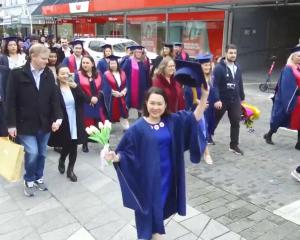
The installation was completed yesterday and includes three 50mx25m experimental aquaculture farms which replicate commercial aquaculture operations.
It is part of a project by the University of Otago’s department of marine science which will allow researchers to develop a more sustainable aquaculture of seaweeds and shellfish, while integrating teaching which considers sustainability and multitrophic aquaculture techniques within the department’s aquaculture and fisheries degree programme.
Marine scientist Prof Steve Wing said multitrophic aquaculture involved different species being cultured alongside each other in a circular biological system, replicating natural ecosystems more closely, and helping balance and recycle bi-products during aquaculture, while enhancing productivity.
"There are two types of aquaculture. There’s passive aquaculture, where you put mussels out and they feed in the environment. Then there is intensive aquaculture, like salmon farming.
"Often in aquaculture we raise a single animal or kelp.

"So it balances out the impact on the environment."
He said the experimental farm aimed to lessen the impact of the growing aquaculture industry on the environment and create more sustainable practices within the industry.
"Hopefully this will be helpful in the future as more and more aquaculture farms are built to feed people."
Prof Wing said the project aligned directly with government policy on development of the marine economy, including the Ministry for Primary Industry’s goal for a $3billion aquaculture industry by 2035.
Otago University was the first tertiary institution to have a directed programme around this priority government policy, he said.
The initiative also coincides with the university offering a new major in marine science for its bachelor of science degree from next year.












